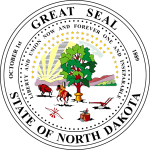Legislative Overview ~ April 7, 2025

It was a productive Monday in the North Dakota Legislature as lawmakers returned to work after the weekend. Both chambers managed to address a significant number of bills and resolutions, but much of their time was spent deliberating and approving amendments from committees. These amendments are essential for refining legislation and ensuring that bills align with the needs of constituents. Both chambers continued to work through a diverse array of topics, ranging from appropriations measures to resolutions addressing constitutional amendments. The focus on committee amendments highlights the detailed and collaborative nature of the legislative process as lawmakers work to finalize bills for floor votes.
Here is a summary of what took place during today’s floor sessions:
9 Bills Passed in the Senate and awaiting Governor’s Signature: HB1032, HB1160, HB1169, HB1199, HB1209, HB1247, HB1469, HB1487, & HB1489. Those which were failed include: HB1259, HB1455, & HB1555.
12 Bills Passed in the House and awaiting Governor’s Signature: HB1058, HB1274, HB1305, HB1341, HB1419, HB1437, HB1483, HB1500, HB1567, HB1615, SB2112, & SB2354 + HCR3037. Those which were failed include: HB1231 & HB1300.
The Bills we are tracking regarding the business world include:
HB1058: https://ndlegis.gov/assembly/69-2025/regular/documents/25-8051-03000.pdf
This Bill establishes regulations for aboveground storage tanks in North Dakota. It defines key terms, outlines the Department of Environmental Quality’s responsibilities, and sets rules for tank operation, leak detection, and corrective actions. The bill mandates permits and inspections, introduces penalties for violations, and provides for emergency response measures. Businesses handling petroleum products and storage facilities will be affected by compliance requirements and potential financial responsibilities
HB1483: https://ndlegis.gov/assembly/69-2025/regular/documents/25-1080-03000.pdf
This Bill proposes an amendment to North Dakota’s oil extraction tax law, reducing the tax rate for oil produced from new wells outside the Bakken and Three Forks formations. The bill increases the eligible production threshold from 75,000 to 90,000 barrels within the first 18 months and applies a reduced 2% tax rate. This change could benefit oil exploration businesses operating outside major formations by providing tax incentives.
HB1584: https://ndlegis.gov/assembly/69-2025/regular/documents/25-1281-03000.pdf
This Bill proposes new regulations for pharmacy benefit managers (PBMs) in North Dakota. It includes amendments to licensing requirements, defines prohibited practices, and mandates transparency in pricing and reimbursement processes. The bill aims to enhance accountability and fairness in how PBMs interact with pharmacies and insurers. Affected stakeholders include pharmacies, healthcare providers, and insurance companies. The bill may increase regulatory oversight while potentially improving transparency in prescription drug pricing.
HB1615: https://ndlegis.gov/assembly/69-2025/regular/documents/25-1214-02000.pdf
This Bill proposes changes to North Dakota’s charitable gaming laws. It requires organizations to secure a lease before applying for a gaming site license and introduces limits on local government requirements for site authorization. The bill also modifies how gaming proceeds can be used, adjusting allowable expense percentages based on revenue. Affected stakeholders include charitable organizations, gaming site operators, and local governments.
~ Today’s legislative sessions in North Dakota saw extensive debate on the issue of banning cellphones in K-12 schools, with both chambers taking significant steps toward addressing this topic. The Senate reconsidered House Bill 1160, which it had previously failed to pass on April 4th with a vote of 19-26. In a dramatic turnaround, the Senate voted overwhelmingly today to pass the bill by a 42-4 margin. Meanwhile, the House deliberated Senate Bill 2354, which contains similar provisions to HB1160, and voted to approve it despite knowing the Senate had already passed its counterpart. Both bills will now head to a conference committee, where legislators from both chambers will work to merge them into a single proposal for final consideration.

These bills aim to establish statewide policies requiring students’ cellphones to be securely stored during school hours, addressing concerns about distractions, academic performance, and mental health. The proposed legislation also includes flexibility for schools in implementing storage solutions and exceptions for medical or educational needs. The debate underscores the complexity of balancing local control with uniform statewide standards, as lawmakers navigate how best to support students’ learning environments while respecting school district autonomy. What are your thoughts? Share below to keep the conversation going!
Jan Wangler, Executive Director

